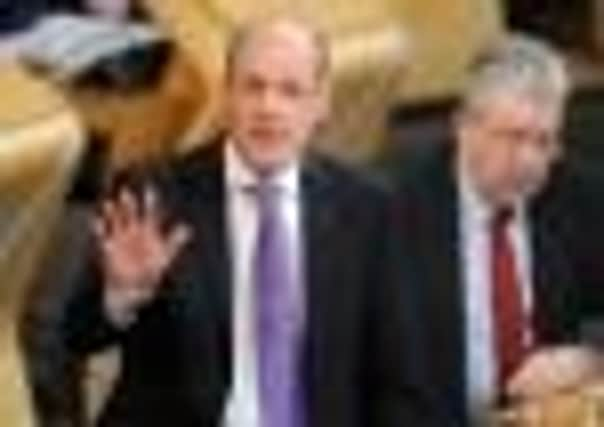Scottish budget: Unions not sold on Swinney’s pay pledge


Mr Swinney used his budget yesterday to announce an easing of the pay policy for 2013-14, capping the total cost of basic pay awards at one per cent but giving priority to those earning less than £21,000 a year and continuing the freeze for those on more than £80,000. However, the budget gave Scotland’s councils what he admitted was a “flat cash settlement”.
Unions said that unless local government was funded to pay the wage increase, there was no guarantee council employees would receive any rise.
Advertisement
Hide AdAdvertisement
Hide AdJohn Stevenson, president of Unison in Edinburgh, said there was a growing disillusionment among council staff.
He said: “It’s hypocrisy for him to say he is lifting the public sector pay freeze, but for thousands of local government workers there is no money to pay for an increase.
“Our members are pretty fed up. They have now seen a 12 per cent cut over the last three years because of the effect of inflation, the pay freeze and pension contributions.
“Attitudes are beginning to change from saying ‘cuts are going to happen, what can we do about it?’ to thinking ‘wait a minute, we’re the ones taking the cuts but the people at the top of society are going up in leaps and bounds’.
“People are really feeling the injustice of it.”
Mr Swinney said the last three years of pay restraint had helped support thousands of public sector jobs, but said there would now be a “modest increase for most employees”.
He said: “The approach I have taken is essentially an acknowledgement that households have taken a great deal of financial strain and we need to give them some additional support.”
Mr Swinney said the one per cent pay rise was “implicit in our funding of public bodies and what we expect them to deliver as part of the budget settlement”.
Challenged on how councils could afford pay rises without extra funding from the Scottish Government, he said: “It’s up to local government to decide what they do about their pay arrangements.”
Advertisement
Hide AdAdvertisement
Hide AdEdinburgh City Council leader Andrew Burns said: “I obviously welcome the Scottish Government’s commitment to a modest one per cent pay increase for the staff within their direct control.
“Clearly, local council staff will be keen to ensure similar treatment and I hope that the Scottish Government’s overall budget figures do include a one per cent increase to councils in order to fund such a modest pay award.”
Edinburgh Chamber of Commerce welcomed Mr Swinney’s announcement of more investment in affordable housing and the acceleration of the school building programme. Managing director Graham Birse said: “Anything that can kick-start construction is good news.”
He said businesses in the Capital would back the £50 million drive to create 10,000 jobs for young people across Scotland using £15m of government cash, £15m of European funding and further contributions from employers.
Mr Birse said: “I think private employers are up for that. We all know young people with qualifications who are looking for a job but just can’t find anything. The private sector in Edinburgh has already demonstrated its support for the Edinburgh Guarantee and other youth employment measures.”
He added that the chamber was disappointed that non-domestic rates were set to rise.
“This is a specific tax on business,” he said. “But it is these businesses that are going to lead the country out of recession, not the public sector.”
Labour and the Tories both rubbished Mr Swinney’s boast of extra cash for colleges.
Lothians Tory MSP Gavin Brown said: “With youth unemployment at unacceptably high levels, the SNP took £50m out of the college sector and then gave back in this budget a measly £17m.”